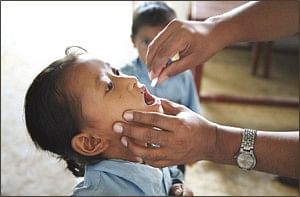Ensuring a worm-free childhood

A child is taking Albendazole at a "In-school deworming programme" in Nepal.
At a crowded health clinic in Kathmandu, parents bring their children to receive albendazole for deworming and a vitamin A supplement to boost nutrition. Nepal's pre-school worm control programme takes place every six months and is delivered by nearly 50,000 female village volunteers.
A Nepali study team aims to test the drug's ongoing effectiveness among local school-age children. They set up an operations base in the Dhading district. Combing through school registers in three or four schools a day, the team identifies two groups of children in each school.
Children participating in the study are given parent consent forms to fill out and return. One test group involves children between ages five and eight, and the other between ages 11 and 14. The younger children had regular doses of albendazole throughout their pre-school years. The older children, who were already in school when the pre-school control programme began in 1999, have never been treated.
Every child - regardless of his or her age group - receives a stool container labeled with a serial number. Study team members clearly explain how to fill the container with a stool sample and bring it back to school the next morning. The following day, the team returns to the school and lab technicians carefully check that each child has provided a stool sample. Each child then receives one tablet of albendazole to take with water. The team then drives back to its makeshift laboratory to prepare and examine the stool samples. During the first 10 days of fieldwork, more than 2000 samples are analysed.
Lab technicians work late into the night to examine all of the stool samples within the same day. Next to each child's identity number, the number of hookworm, whipworm and roundworm eggs found in his or her sample are recorded.
After three weeks (the ideal interval to assess the curative effect of the drug and avoid positive samples due to re-infection) the team returns to the schools. Children identified as infected during the first round are re-tested in exactly the same way as before and then the difference in the number of eggs between the two rounds is compared.
Data analysis done in Nepal and by WHO show that the albendazole is still effective despite years of intensive use.
The result is good news for child health. Albendazole is one of only four available WHO-recommended drugs for controlling intestinal worms, and one of the easier ones to administer. In-school deworming programmes that seamlessly start when pre-school programmes end can help ensure a worm-free childhood.
This programme can be replicated in the schools of developing countries.
Source: WHO

 For all latest news, follow The Daily Star's Google News channel.
For all latest news, follow The Daily Star's Google News channel. 



Comments